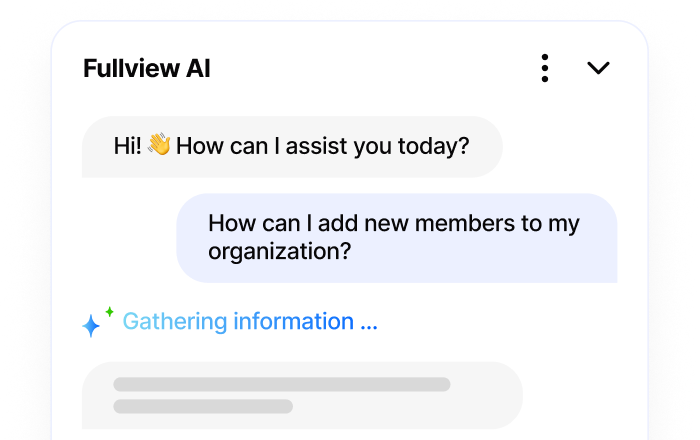Knowledge bases organize documentation. They store help articles, FAQs, tutorials, and product guides in searchable libraries. Teams use platforms like Zendesk, Intercom, Salesforce, HubSpot, and others to build and maintain these resources.
To turn that documentation into autonomous AI support, teams connect platforms like Fullview that build AI agents from knowledge base content. These agents answer customer questions conversationally, provide visual guidance, and handle support interactions using your existing documentation.
This guide covers leading knowledge base platforms and how to build AI agents from your knowledge base content.
Knowledge Base Software Comparison
Zendesk Guide: Enterprise Knowledge Base Platform
Zendesk Guide handles large-scale documentation with content management, AI-powered insights, and collaborative editing. The platform supports both internal and external knowledge bases with multilingual capabilities.
Key features:
- Separate knowledge bases for customers and internal teams
- AI-powered content suggestions and gap identification
- Collaborative editing with team publishing workflows
- Multilingual support (40+ languages)
- Version control and content scheduling
- Integration with Zendesk's support suite
Pricing: Suite Team starts at $69/user/month. Suite Professional is $149/user/month. Enterprise tier offers custom pricing.
Best for: Large organizations needing comprehensive knowledge management with advanced permissions and multilingual capabilities.
Building AI agents: Connect Fullview to Zendesk Guide to build conversational AI agents from your documentation. The integration pulls articles automatically, allowing you to create agents that use your knowledge base content to answer questions and provide visual guidance.
Intercom Articles: Customer-Facing Knowledge Base
Intercom Articles integrates with Intercom's messaging platform. The system delivers help content within customer conversations and provides article analytics to track performance.
Key features:
- Articles embedded in customer conversations
- Multilingual content support
- Article performance analytics
- SEO-optimized help center
- Content suggestions based on customer inquiries
- Integration with Intercom's support tools
Pricing: Essential plan starts at $39/seat/month. Advanced features available on higher tiers starting at $99/seat/month.
Best for: SaaS companies using Intercom for customer messaging who want integrated help documentation.
Building AI agents: Fullview connects to Intercom Articles to train AI agents on your help content. Build agents that answer customer questions conversationally and add visual guidance for complex product workflows, all using your existing Intercom documentation.
Salesforce Knowledge: CRM-Integrated Documentation
Salesforce Knowledge integrates documentation directly with customer records and case management. The platform emphasizes article suggestions based on case context and customer history.
Key features:
- Integration with Salesforce Service Cloud
- Article recommendations based on case data
- Multi-language support and translation
- Article lifecycle management
- Knowledge article templates
- Search optimization and analytics
Pricing: Starts at $25/user/month. Professional tier with enhanced features costs $80/user/month. Einstein AI features require additional licensing.
Best for: Organizations using Salesforce CRM who need documentation tied to customer records and support cases.
Building AI agents: Connect Fullview to Salesforce Knowledge to create AI agents from your documentation. Agents can answer questions conversationally, provide visual product guidance, and escalate to Salesforce Service Cloud with complete context when needed.
HubSpot Knowledge Base: Documentation with CRM Integration
HubSpot Knowledge Base connects help content to customer records, deal history, and support tickets. The system integrates with HubSpot's CRM to provide context-aware documentation.
Key features:
- Knowledge base builder with SEO optimization
- Integration with HubSpot CRM and Service Hub
- Article performance analytics
- Content recommendations based on customer data
- Multilingual support capabilities
- Custom domain and branding options
Pricing: Free plan available with basic features. Paid plans start at $15/seat/month. Professional tier with advanced features starts at $90/month (for 5 users).
Best for: Growing companies using HubSpot for marketing or sales who want documentation integrated with customer data.
Building AI agents: Fullview connects to HubSpot Knowledge Base to build AI agents from your help content. Create agents that handle customer questions autonomously and provide visual guidance using your existing HubSpot documentation.
Pylon: Documentation for Technical Teams
Pylon organizes documentation alongside customer conversations in Slack. The platform pulls context from Linear, GitHub, and other development tools to provide technical reference material.
Key features:
- Integration with Slack, Linear, and GitHub
- Documentation tied to customer conversations
- Technical reference material organization
- Search across multiple documentation sources
- Context from product usage and code
- Analytics on documentation usage
Pricing: Custom pricing based on team size and integrations needed.
Best for: Developer-focused companies and technical products where documentation lives alongside engineering tools.
Building AI agents: Connect Fullview to Pylon to create AI agents from your technical documentation. Build agents that understand both your product documentation and engineering context, providing support that bridges customer questions with technical details.
Notion: Flexible Internal Documentation
Notion offers customizable documentation beyond traditional knowledge base structures. Teams use it to create wikis, databases, and collaborative workspaces tailored to specific needs.
Key features:
- Highly customizable layouts and content types
- Real-time collaborative editing
- Version control and change tracking
- Integration with popular tools and workflows
- Mobile app for access anywhere
- Database and table functionality
Pricing: Free plan for up to 10 users. Business plan is $15/user/month for up to 100 users.
Best for: Internal documentation where flexibility and customization matter more than customer-facing features.
Confluence: Team Documentation and Collaboration
Confluence focuses on team collaboration and internal documentation. The platform integrates with Jira and other Atlassian tools for technical teams managing product documentation.
Key features:
- Page hierarchies and space organization
- Real-time collaborative editing
- Integration with Jira and Atlassian suite
- Page templates for consistent documentation
- Version history and page archiving
- Permissions and access controls
Pricing: Free plan for up to 10 users. Standard plan is $6.05/user/month. Premium is $11.55/user/month.
Best for: Teams using Atlassian products who need documentation integrated with project management and development tools.
Document360: Technical Documentation Platform
Document360 handles version control, content categorization, and collaborative editing for technical documentation. The platform focuses on external product documentation and API references.
Key features:
- Version control for tracking changes
- Content categorization with clear navigation
- File manager for images, videos, and documents
- Collaboration tools with discussion and comments
- Knowledge base templates for faster creation
- Article-level permissions for security
Pricing: Lifetime free plan for 1 project with 2 users. Paid plans start at $149/month per project for 3 users.
Best for: Teams creating technical documentation who need version control and collaborative editing.
Fullview: Build AI Support Agents From Your Knowledge Base
Fullview connects to your knowledge base and builds AI support agents from your documentation. Instead of just storing articles, your knowledge base becomes the training source for conversational AI agents that can answer questions and provide visual guidance.
The platform integrates with Zendesk, Intercom, Salesforce, HubSpot, and Pylon knowledge bases. You can also upload files directly or scan your help center website to pull in documentation.
Key capabilities:
Knowledge Base Integration
- Native connectors for Zendesk, Intercom, Salesforce, HubSpot, and Pylon
- Scan websites to pull help center articles
- Upload files directly (PDFs, docs, CSV, JSON)
- Create custom snippets for quick instructions
- Combine multiple knowledge sources for comprehensive coverage
Conversational AI Agents
- Build agents using your existing knowledge base content
- No-code interface for training and customization
- Customizable personality and tone of voice
- Handles both chat and email support channels
- Topic management to control which questions get answered
- Knowledge gap analysis to identify missing documentation
Visual AI Guidance
- DOM analysis to understand your product interface
- On-screen walkthroughs that highlight specific elements
- Step-by-step visual instructions for complex workflows
- Contextual help based on user location in your application
- Shows users what to do when documentation alone isn't enough
Easy Agent Building
- Playground mode for testing responses before launch
- Connect your knowledge base in minutes
- Iterative improvement based on actual usage
- Whitelist internal users for testing
- Deploy through existing chat interface or Fullview widget
Smart Escalation
- Automatic session replay capture for all interactions
- Cobrowsing when human agents need to take over
- Full console logs and technical context passed to agents
- Complete conversation history maintained
- Seamless handoff without customers repeating themselves
Integration Flexibility
- Works with Zendesk, Intercom, Salesforce, HubSpot, and Pylon
- Can also run as standalone widget in your application
- Deploy across web and mobile interfaces
- API access for custom integrations
Pricing:
- Free plan: 50 conversations/month with core features
- Growth plan: Usage-based pricing starting at $96/month for 200 conversations ($0.48 per conversation)
- Custom plan: Advanced features, dedicated success manager, SLA guarantees
- 14-day free trial includes all Growth plan features
- 20% discount on annual billing
Add-ons:
- AI Analytics: $189/month for support performance insights
- AI Replays: $199/month for automatic interaction recordings
- Cobrowsing: Custom pricing for real-time screen sharing
Best for: Software companies with knowledge bases who want to turn documentation into autonomous AI agents that handle support conversations and provide visual guidance.
Why teams choose Fullview: Knowledge bases organize documentation. Fullview uses that documentation to build AI agents that can answer questions conversationally and show users what to do visually. Connect your existing knowledge base and start building agents in minutes without any code.
Why Teams Build AI Agents From Knowledge Bases
Knowledge bases store documentation. AI agents use that documentation to help customers autonomously.
Different purposes:
Knowledge bases excel at:
- Organizing articles, tutorials, and product guides
- Providing searchable repositories of information
- Maintaining version control and content updates
- Supporting SEO for help article discovery
- Centralizing documentation for teams
AI agent platforms excel at:
- Using knowledge base content to answer questions conversationally
- Providing visual guidance when text alone isn't enough
- Handling customer inquiries autonomously 24/7
- Deflecting support tickets before they're created
- Escalating with full context when human help is needed
How they work together:
Teams maintain documentation in platforms like Zendesk, Intercom, or Salesforce. These systems handle content creation, organization, and updates. Fullview connects to these knowledge bases, trains AI agents on the content, and deploys those agents to handle customer support.
When customers ask questions, AI agents pull from your knowledge base to provide answers. For complex product questions, agents can show visual walkthroughs in your application. When agents reach their limits, they escalate to human support with complete conversation history and session context.
Results teams see:
- 40-60% reduction in support tickets on questions already documented
- Customers get immediate answers instead of waiting for agent availability
- Knowledge base content gets used more effectively through conversational AI
- Support teams focus on complex cases rather than answering documented questions
- Visual guidance reduces back-and-forth on "how to" inquiries
The platforms complement each other. Your knowledge base remains your documentation system. Fullview becomes the layer that turns that documentation into autonomous AI support.
How to Choose Your Knowledge Base Setup
Pick your knowledge base platform
Choose based on:
- Internal vs customer-facing documentation needs
- Team size and collaboration requirements
- Integration with existing tools (CRM, helpdesk, etc.)
- Customization and branding requirements
- Budget and pricing structure
Most teams already have a knowledge base. If you're choosing a new one, prioritize content organization features and team workflow fit.
Evaluate if you need AI agents
Build AI agents from your knowledge base if:
- You have comprehensive documentation but customers still create support tickets
- Users ask questions that are already answered in your knowledge base
- Support agents spend time answering documented questions
- Text articles don't effectively guide users through complex workflows
- You want autonomous support that uses your existing documentation
Skip AI agents if:
- Your documentation has significant gaps (fix content first)
- Most support requests aren't about product functionality
- Your product is simple enough that articles alone solve issues
- Support volume is already low and manageable
Test AI agents with your knowledge base
Start with:
- Fullview free plan (50 conversations/month) connected to your knowledge base
- Identify top 10 questions customers ask that are documented
- Build AI agents on those topics and measure deflection
- Test visual guidance for complex workflows
- Compare ticket volume before and after
Scale when:
- AI agents demonstrate clear deflection on documented topics
- CSAT scores on AI interactions meet standards
- Visual guidance shows measurable impact on resolution
- Knowledge gap analysis reveals documentation improvements
Most teams see results within 30-60 days of connecting AI agents to their knowledge base.
Frequently Asked Questions
What is knowledge base software?
Knowledge base software organizes documentation into searchable libraries. Teams use these platforms to create and maintain help articles, FAQs, tutorials, and product guides. Common platforms include Zendesk Guide, Intercom Articles, Salesforce Knowledge, HubSpot Knowledge Base, and Confluence.
How do AI agents use knowledge base content?
AI agents connect to knowledge bases as training sources. Platforms like Fullview pull documentation from your knowledge base, train conversational AI agents on that content, and deploy agents to handle customer questions. When customers ask questions, agents use your documentation to provide answers and visual guidance.
Can I use my existing knowledge base with AI agents?
Yes. Fullview integrates with Zendesk, Intercom, Salesforce, HubSpot, and Pylon knowledge bases. You can also upload documentation files directly or scan your help center website. The platform trains AI agents on your existing content without requiring migration.
Do I need both a knowledge base and AI agents?
Most teams benefit from both. Knowledge bases organize and maintain documentation. AI agent platforms use that documentation to provide autonomous support. Your knowledge base remains your content management system. AI agents become the layer that uses that content to help customers conversationally.
How much does knowledge base software cost in 2025?
Pricing varies significantly. Free options exist (Notion for up to 10 users, Confluence for up to 10 users). Paid plans range from $15-39/user/month for basic platforms to $69-149/user/month for enterprise solutions. Fullview uses conversation-based pricing starting at free (50 conversations/month).
What makes a good knowledge base?
Good knowledge bases have clear organization, powerful search, accurate content, regular updates, and easy navigation. They should answer common customer questions comprehensively and work well on mobile devices. Integration with support tools and analytics on article performance matter for measuring effectiveness.
Can AI agents handle questions not in the knowledge base?
AI agents work best when trained on comprehensive documentation. When questions fall outside the knowledge base scope, agents can escalate to human support with full conversation context. Knowledge gap analysis in Fullview identifies frequently asked questions that lack documentation so teams can fill those gaps.
Ready to build AI support agents from your knowledge base? Connect Fullview to Zendesk, Intercom, Salesforce, HubSpot, or Pylon and turn your documentation into conversational AI agents with visual guidance capabilities. Start free trial


.png)





.webp)
